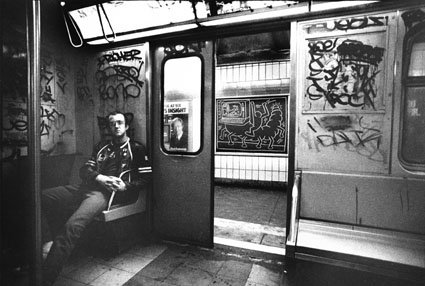Tate Liverpool and LJMU host major Keith Haring conference
Keith Haring: Art and Activism in 1980s New York

On Thursday 7th and Friday 8th November Tate Liverpool is hosting a two-day conference in partnership with Liverpool John Moores University, on the occasion of the Keith Haring exhibition.
Conveners: Dr Michael Birchall and Dr Emma Vickers.
Keith Haring developed his practice at a time of immense social change, through the end of the cold war, and up to the rise of neoliberalism, he became an artist who would actively campaign for social justice. Working in New York, and internationally Haring engaged in collaborations with communities, artists and musicians to generate visual material that demonstrated his activist sprit. He is perhaps best known for his activism around HIV/AIDS, creating posters and drawings, such as the iconic, Silence = Death (1989)
This conference presents a range of perspectives on Haring’s life and crucially new scholarship from academics, artists, curators and writers, who are leading experts in their fields: Dagmawi Woubshet (University of Pennsylvania), Fiona Anderson (Newcastle University, UK), Ricardo Montez and Ted Kerr (The New School), Leah Pines (Brown University), Natalie Phillips (Ball State University, Indiana), and, Amy Raffel and Ed Webb-Ingall (Independent scholars). As a result of their on going residency with Tate Liverpool and the Keith Haring Foundation, Patrick Staff will present an audio-visual contribution as a culmination of their research at the Haring Archive.
As well as academic papers, there will also be an opportunity for discourse in panel discussions and breakout sessions. Throughout the two days, a range of themes will be explored, and this includes: the political implications of alternative communities in New York; the significance of cultural production around HIV/AIDS; and, the complexities of race, desire and queer genealogies.
For more information please visit: https://www.tate.org.uk/whats-on/tate-liverpool/exhibition/keith-haring/keith-haring-art-and-activism-1980s-new-york
Complementary tickets are available for LJMU staff and students using the booking code LJMU


